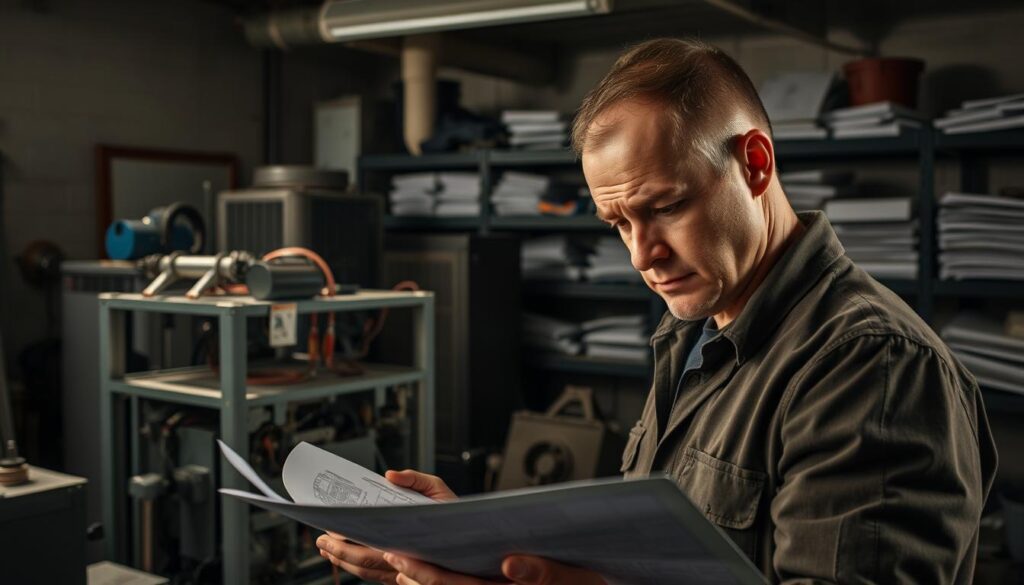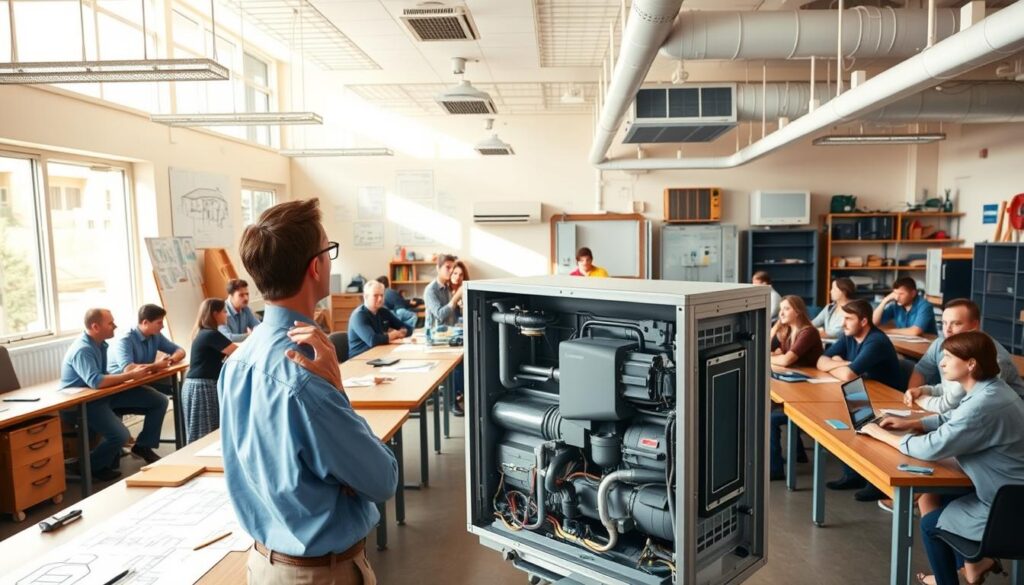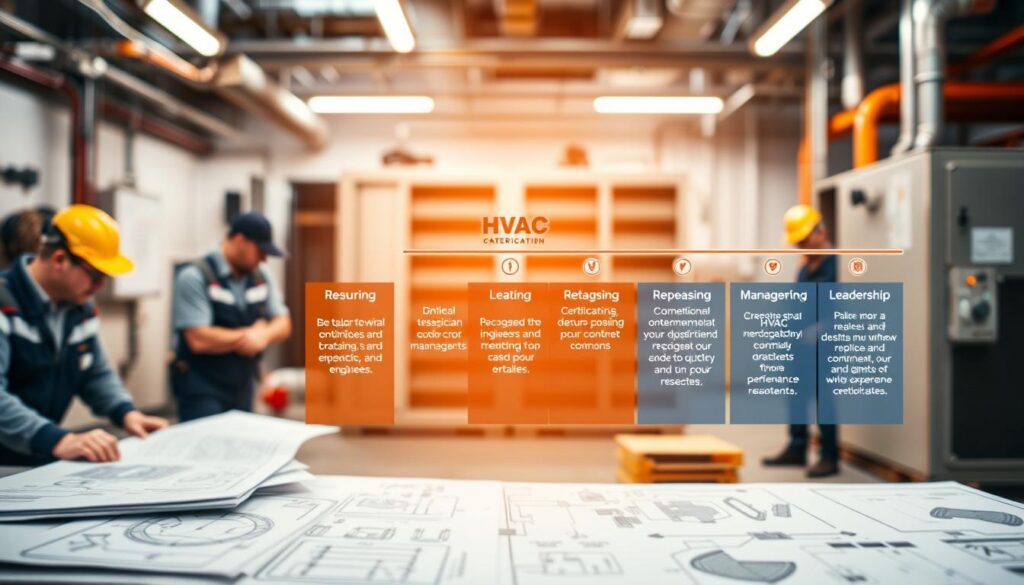Affiliate Disclosure
HVAC Guide Guys is a participant in the Amazon Services LLC Associates Program, an affiliate advertising program designed to provide a means for sites to earn advertising fees by advertising and linking to Amazon.
How Hard Is HVAC Engineering? Ever thought about how tough HVAC engineering is? Is it a field that needs super skills or can anyone learn it with hard work?

HVAC engineering is a complex field. It needs a mix of science, practical skills, and problem-solving. To understand how hard it is, you must enter a world where tech meets real-world use.
About 40% of HVAC techs say their job needs a deep grasp of complex areas like thermodynamics and electrical engineering. This shows the level of difficulty HVAC pros face in their careers.
Starting in HVAC engineering means always learning, being technically skilled, and flexible. You’ll need to know about complex parts and how to install them. This job is both tough and full of chances for growth.
Key Takeaways
- HVAC engineering requires strong technical and analytical skills
- Continuous education is critical for career advancement
- Practical experience complements theoretical knowledge
- Problem-solving abilities are essential in this field
- Career offers diverse opportunities across multiple industries
Table of Contents
Understanding the Basics of HVAC Engineering
HVAC engineering is a complex field that needs a deep understanding of many scientific principles. Starting your journey in this field means learning about the basic parts and complex systems that control indoor climate.
To succeed in HVAC engineering, you must know a lot about several important areas. You need to understand thermodynamics, fluid dynamics, and electrical engineering. These are the core engineering principles that HVAC systems are built on.
Core Engineering Principles
The basics of HVAC engineering are built on several key scientific principles:
- Thermodynamic heat transfer mechanisms
- Fluid dynamics and airflow management
- Electrical system integration
- Energy efficiency optimization
Fundamental Technical Requirements
To do well in HVAC engineering, you must master certain technical skills. These skills help you face the challenges of HVAC engineering:
- Advanced mathematical calculations
- Comprehensive system design skills
- Diagnostic and troubleshooting techniques
- Software modeling capabilities
Essential System Components
Knowing the key parts of HVAC systems is vital for success. Here’s a list of the most important components:
| Component | Function | Efficiency Impact |
|---|---|---|
| Compressor | Circulates refrigerant | Up to 20% system efficiency |
| Heat Exchanger | Transfers thermal energy | Critical for temperature regulation |
| Thermostat | Controls temperature settings | Can reduce energy costs by 10-15% |
“Success in HVAC engineering comes from understanding not just the components, but how they work together seamlessly.” – HVAC Industry Expert
By learning all about these basics, you’ll be ready to face the complex challenges of HVAC engineering. You’ll be set for a successful career in this exciting field.
Career Paths in HVAC Engineering
Exploring HVAC careers shows a field full of variety and growth. You can start in many ways and specialize in areas that interest you. Your HVAC engineering path can be exciting and rewarding.
There are two main ways to begin your HVAC career:
- Entry-level jobs with hands-on training
- Structured HVAC Technician Training Programs
The Bureau of Labor Statistics lists key skills for HVAC success:
- Mathematical reasoning
- Mechanical ability
- Problem-solving
- Creativity
- Active listening
Specialization opportunities in HVAC engineering are vast. You can work on everything from home systems to big industrial projects. You might find yourself in places like:
- HVAC design firms
- Government agencies
- Equipment manufacturing companies
- Automotive industry
- Renewable energy sectors
“The HVAC field offers dynamic career paths with continuous learning and growth opportunities.” – Industry Expert
As you grow, you can aim for advanced roles like energy auditor or refrigeration technician. Getting certified and keeping up with education can boost your career and job prospects.
Explore Our HVAC Shop
Looking for top-rated HVAC tools, parts, and accessories? Visit our shop and find the perfect solution for your needs.
Visit the ShopHow Hard Is HVAC Engineering: A Complete Analysis
HVAC engineering is a complex field that tests your skills and problem-solving abilities. It’s a demanding yet rewarding career in heating, ventilation, and air conditioning engineering.
Technical Challenges in HVAC Engineering
HVAC engineering requires a deep understanding of technical concepts and continuous learning. You’ll need to master complex systems and advanced technologies like smart thermostats. The technical challenges include:
- Advanced system design calculations
- Understanding refrigeration cycles
- Mastering psychrometric principles
- Software proficiency in design tools
Physical Demands of the Profession
HVAC engineering also demands physical strength and resilience. You’ll face challenging work environments that test your endurance. These include:
- Working in confined spaces
- Navigating extreme temperature conditions
- Lifting heavy equipment
- Performing installations in difficult locations
Mental Requirements and Skills
Success in HVAC engineering requires strong mental abilities. You need critical thinking, quick decision-making, and problem-solving skills. You’ll analyze complex systems, troubleshoot issues, and find innovative solutions under pressure.
“HVAC engineering is a blend of technical expertise, physical endurance, and mental agility.” – Industry Expert
| Skill Category | Required Proficiencies |
|---|---|
| Technical Knowledge | Advanced system design, software tools, thermodynamics |
| Physical Skills | Strength, flexibility, spatial awareness |
| Mental Capabilities | Critical thinking, rapid problem-solving, adaptability |
The difficulty of HVAC engineering depends on your preparation, skills, and passion. With dedication and continuous learning, you can overcome challenges and grow professionally.
Explore Our HVAC Shop
Looking for top-rated HVAC tools, parts, and accessories? Visit our shop and find the perfect solution for your needs.
Visit the ShopEducational Requirements and Certification Process

Starting a career in HVAC engineering means understanding the educational and certification steps. You’ll need to know the key requirements for a solid foundation in your career.
Most HVAC professionals start with training programs lasting from 6 months to 2 years. These programs mix theory with practical skills, preparing you for certification.
- Certificate Programs: 32-40 weeks of intensive training
- Associate Degree: 2-year curriculum
- Apprenticeship: 3-5 years of hands-on experience
The cost of your education can vary a lot, from $500 to $30,000. Many schools offer HVAC programs, like:
- Ferris State University
- Pennsylvania College of Technology
- Triangle Tech
- Texas State Technical College
“Certification shows your technical skill and commitment in HVAC.” – Industry Expert
Certification is key for moving up in your career. You need EPA certification for refrigerant handling, which means passing the EPA 608 exam. Also, NATE (North American Technician Excellence) certification proves your technical skills.
| Certification Type | Requirements | Duration |
|---|---|---|
| EPA Refrigerant | Exam Passage | Varies |
| NATE Certification | Technical Competence Test | Renewable |
| State Licensing | Work Experience | 4-5 Years |
Your future in HVAC engineering looks bright, with a 15% job growth expected by 2026. Invest in your education and get the right certifications. You’ll be ready to succeed in this exciting field.
Mathematical Skills and Technical Knowledge
HVAC engineering needs a strong base in math and technical skills. Your success depends on solving complex problems and understanding calculations. You must know more than basic math, as technical skills are key to designing and maintaining HVAC systems.
Required Math Proficiency
To succeed in HVAC, you need to understand many math concepts. You’ll have to know:
- Basic arithmetic operations
- Algebra fundamentals
- Geometry principles
- Trigonometric calculations
Technical Calculations in HVAC
HVAC professionals do important math that affects system performance. Your problem-solving skills will be tested with these calculations:
| Calculation Type | Practical Application |
|---|---|
| BTU Requirements | Determining heating and cooling capacity |
| Airflow Rates | Ensuring optimal system ventilation |
| Pressure Drop | Analyzing system efficiency and performance |
Problem-Solving Applications
Your math skills help solve real-world problems. HVAC technicians use them to fix issues, design systems, and improve performance. Being able to quickly and accurately calculate can prevent costly repairs.
Mastering mathematical skills is not just about numbers—it’s about understanding complex system interactions and finding innovative solutions.
The United States Bureau of Labor Statistics says HVAC jobs will grow. About 19,000 more mechanics and installers will be needed soon. Having strong math and technical skills will help you succeed in this field.
Explore Our HVAC Shop
Looking for top-rated HVAC tools, parts, and accessories? Visit our shop and find the perfect solution for your needs.
Visit the ShopDaily Responsibilities and Job Demands
Being an HVAC engineer means you face a dynamic and challenging job every day. You need technical skills, physical strength, and problem-solving abilities in many different places.
Your day will be filled with important tasks that test your skills and flexibility. HVAC jobs require you to:
- System diagnostics and troubleshooting
- Installation of complex heating and cooling systems
- Conducting thorough equipment maintenance
- Performing detailed performance evaluations
- Documenting service interactions and technical assessments
HVAC jobs are not just about fixing things. You’ll work with advanced equipment, use special tools, and face tough environments. This can range from homes to big commercial buildings.
“Success in HVAC engineering requires a blend of technical knowledge, practical skills, and customer service orientation.” – HVAC Industry Expert
For HVAC jobs, you need certain skills. These include:
| Skill Category | Required Competencies |
|---|---|
| Technical Skills | System diagnostics, refrigeration knowledge, electrical systems understanding |
| Physical Requirements | Ability to lift 50+ pounds, work in confined spaces, perform tasks in extreme temperatures |
| Professional Skills | Communication, customer service, detailed documentation, problem-solving |
Your success will depend on continuous learning and adapting to technological advancements in heating, ventilation, and air conditioning systems.
Industry Challenges and Work Environment
The HVAC engineering world is full of challenges that test your skills and determination. You’ll need to be adaptable and solve problems in different settings.
HVAC technicians face complex work environments and many technical demands. They work on everything from home installations to complex commercial systems.
Physical Working Conditions
HVAC engineers work in various conditions that test their physical limits. They might face:
- Extreme temperature ranges
- Confined spaces in mechanical rooms
- Rooftop installations at significant heights
- Construction sites with unpredictable conditions
Time Management Pressures
Managing your time well is key to success. Busy seasons like summer mean long hours and overtime.
| Season | Work Intensity | Average Hours |
|---|---|---|
| Summer | High | 50-60 hours/week |
| Winter | Moderate | 40-45 hours/week |
Safety Considerations
Safety is always a top priority in HVAC engineering. Workers must follow strict safety rules when working with complex systems.
“In HVAC engineering, your safety is as critical as the systems you design and maintain.” – Industry Professional
Being able to lift up to 50 pounds and work at heights over 50 feet shows the job’s physical demands. Working well with construction engineers and urban architects highlights the teamwork needed in HVAC.
Career Growth and Advancement Opportunities

The HVAC industry is booming, with many chances for career growth. As the demand for HVAC services increases, you can move beyond basic jobs. This opens up a world of possibilities for your future.
There are many paths you can take in the HVAC field:
- Field Service Technician
- Technical Estimator
- Project Manager
- Shop Supervisor
- HVAC Sales Engineer
Employment in HVAC is expected to rise by 13% from 2018 to 2028. This is much faster than many other jobs, giving you lots of chances to grow.
“The key to success in HVAC is continuous learning and skill diversification.” – Industry Expert
Getting ahead in HVAC usually means gaining more experience:
| Experience Level | Typical Position | Average Hourly Rate |
|---|---|---|
| Entry-Level (0-1 years) | Technician Apprentice | $22.47 |
| Mid-Level (3-6 years) | Certified Technician | $24.32 |
| Senior-Level (7+ years) | Senior Technician/Manager | $32.83 |
Exploring special areas like Indoor Air Quality Inspector, Energy Auditor, and Solar Technician can boost your career. Keep learning and getting certified to build a fulfilling HVAC career.
Explore Our HVAC Shop
Looking for top-rated HVAC tools, parts, and accessories? Visit our shop and find the perfect solution for your needs.
Visit the ShopSalary Expectations and Market Demand
The HVAC industry offers promising career opportunities with competitive compensation and strong market growth. Understanding the salary landscape helps you make informed decisions about your professional path in this dynamic field.
Entry-Level Compensation
As a new HVAC technician, you can expect an attractive starting salary. The average for entry-level professionals is around $37,410 per year. The U.S. Bureau of Labor Statistics reports that the lowest 10% of HVAC technicians earn approximately $36,170 annually.
Advanced Position Earnings
Your earning increases with experience and specialized skills. Experienced HVAC technicians can expect an average salary of $71,420 per year. Additional overtime can push annual earnings beyond $80,000.
Regional Salary Variations
| State | Salary Variance |
|---|---|
| Alaska | +7.8% |
| Oregon | +7.61% |
| Massachusetts | +7.40% |
| Florida | -32.04% |
| West Virginia | -29.35% |
The hvac industry expectations highlight significant regional salary differences. Top-paying cities include San Diego, Denver, and Sacramento, with competitive compensation packages.
Job Market Outlook
- Projected job growth: 6% nationwide
- Estimated 37,700 job openings annually
- Current HVAC technician jobs: 415,800
“For every 2 individuals entering the HVAC trades, 5 are retiring, creating substantial opportunities for new professionals.”
The hvac career demands are strong, with an estimated 46,000 new jobs expected by 2028. Certifications like EPA Type Certification and NATE can significantly boost your earning and marketability.
Investing in your HVAC career promises substantial financial rewards and job security in a growing industry.
Common Obstacles and How to Overcome Them
Working in HVAC engineering is tough. You need great problem-solving skills and a smart plan. Your skills will be tested every step of the way.
“Success in HVAC engineering comes from understanding challenges before they become critical problems.”
The first year of HVAC training is very hard. You must learn to solve problems well to succeed. You’ll face many big challenges:
- Rapidly evolving technological requirements
- Complex system integrations
- Physical job demands
- Continuous learning expectations
Here are some ways to beat these challenges:
- Start with a solid technical base
- Connect with seasoned pros
- Keep learning new things
- Stay flexible and strong
| Challenge | Solution Strategy |
|---|---|
| Technology Changes | Regular training and certification updates |
| Physical Demands | Proper ergonomic practices and fitness |
| Complex Calculations | Advanced software and continuous learning |
Seeing challenges as chances to grow will set you apart in HVAC engineering.
Conclusion
Exploring HVAC engineering shows it’s a dynamic and rewarding career. It requires dedication and a love for learning. The HVAC industry is expected to grow by 13 percent from 2018 to 2028. This means big opportunities for those who are willing to learn and grow.
HVAC careers need more than just technical skills. You’ll also need to be resilient, solve problems, and keep learning. The industry is facing a challenge with an aging workforce. This is a great chance for motivated people to join and grow.
Your success in HVAC engineering comes from getting certifications and staying up-to-date with new technologies. It also helps to develop both technical and people skills. Trade schools like IntelliTec College offer great training to start your career. This field is not just a job; it’s a chance to help make buildings more energy-efficient and innovative.
Considering a career in HVAC engineering? It’s challenging but very rewarding. The industry needs skilled people to design, maintain, and improve heating, cooling, and ventilation systems. Your hard work can make a big difference in creating more energy-efficient and comfortable spaces for businesses and communities.

